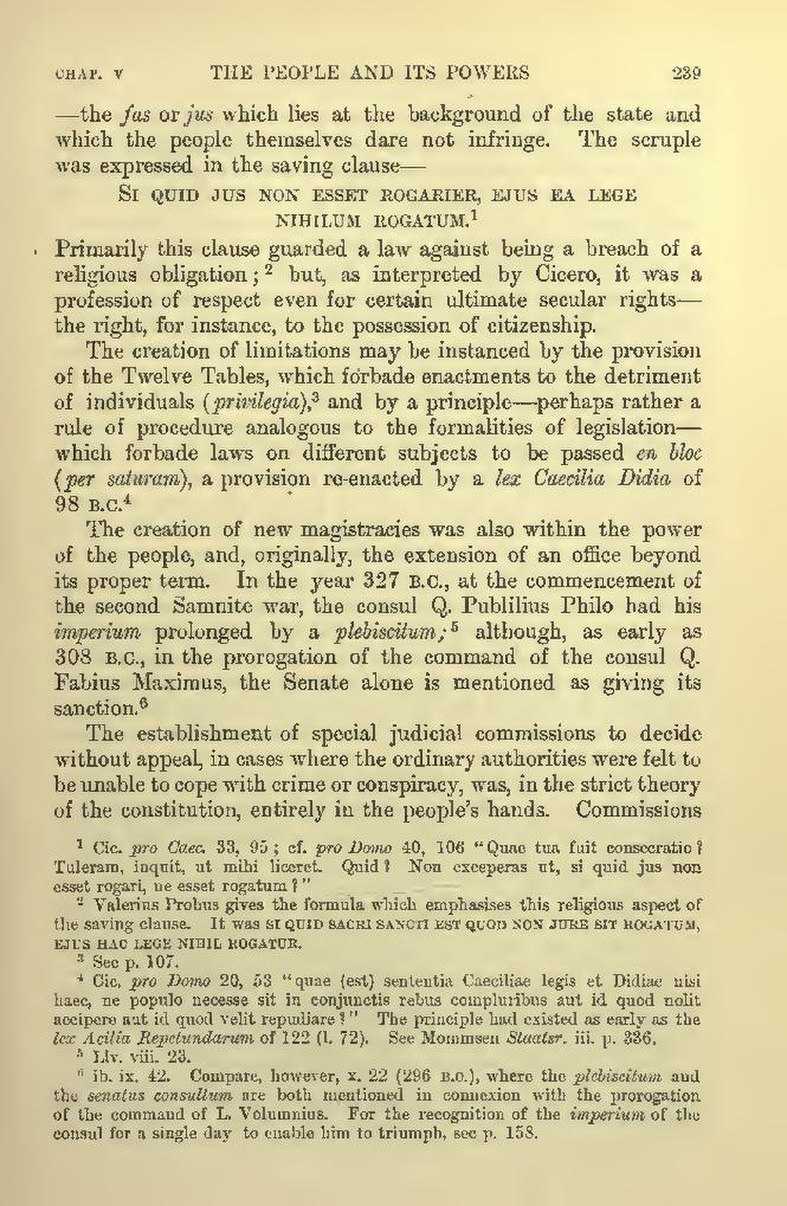- —the fas or jus which lies at the background of the state and
which the people themselves dare not infringe. The scruple was expressed in the saving clause—
Si quid jus non esset rogarier, ejus ea lege
nihilum rogatum.[1]
Primarily this clause guarded a law against being a breach of a
religious obligation;[2] but, as interpreted by Cicero, it was a
profession of respect even for certain ultimate secular rights—the
rights for instance, to the possession of citizenship.
The creation of limitations may be instanced by the provision of the Twelve Tables, which forbade enactments to the detriment of individuals (privilegia),[3] and by a principle—perhaps rather a rule of procedure analogous to the formalities of legislation—which forbade laws on different subjects to be passed en bloc (per saturam), a provision re-enacted by a lex Caecilia Didia of 98 B.C.[4]
The creation of new magistracies was also within the power of the people, and, originally, the extension of an office beyond its proper term. In the year 327 B.C., at the commencement of the second Samnite war, the consul Q. Publilius Philo had his imperium prolonged by a plebiscitum;[5] although, as early as 308 B.C., in the prorogation of the command of the consul Q. Fabius Maximus, the Senate alone is mentioned as giving its sanction.[6]
The establishment of special judicial commissions to decide without appeal, in cases where the ordinary authorities were felt to be unable to cope with crime or conspiracy, was, in the strict theory of the constitution, entirely in the people's hands. Commissions
- ↑ Cic. pro Caec. 33, 95; cf. pro Domo 40, 106 "Quae tua fuit consecratio? Tuleram, inquit, ut mihi liceret. Quid? Non exceperas ut, si quid jus non esset rogari, ne esset rogatum?"
- ↑ Valerius Probus gives the formula which emphasises this religious aspect of the saving clause. It was SI QUID SACRI SANCTI EST QUOD NON JURE SIT ROGATUM, EJUS HAC LEGE NIHIL ROGATUR.
- ↑ See p. 107.
- ↑ Cic. pro Domo 20, 53 "quae (est) sententia Caeciliae legis et Didiae nisi haec, ne populo necesse sit in conjunctis rebus compluribus aut id quod nolit accipere aut id quod velit repudiare?" The principle had existed as early as the lex Acilia Repetundarum of 122 (l. 72). See Mommsen Staatsr. iii. p. 336.
- ↑ Liv. viii. 23.
- ↑ ib. ix. 42. Compare, however, x. 22 (296 B.C.), where the plebiscitum and the senatus consultum are both mentioned in connexion with the prorogation of the command of L. Volumnius. For the recognition of the imperium of the consul for a single day to enable him to triumph, see p. 158.
